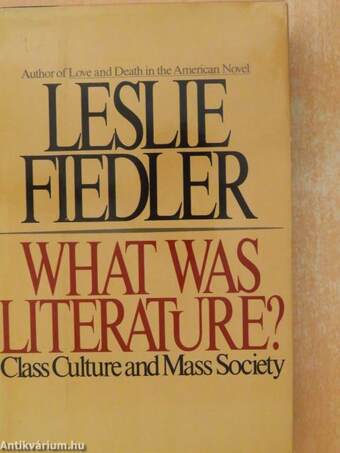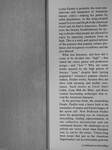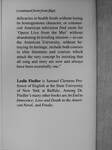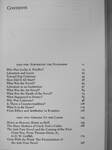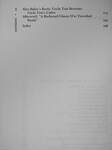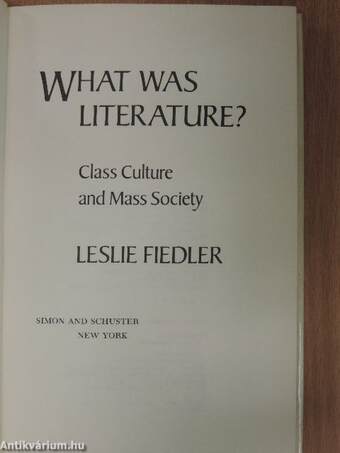1.066.444
kiadvánnyal nyújtjuk Magyarország legnagyobb antikvár könyv-kínálatát

VISSZA
A TETEJÉRE
JAVASLATOKÉszre-
vételek
What Was Literature?
Class Culture and Mass Society
| Kiadó: | Simon and Schuster |
|---|---|
| Kiadás helye: | New York |
| Kiadás éve: | |
| Kötés típusa: | Félvászon |
| Oldalszám: | 258 oldal |
| Sorozatcím: | |
| Kötetszám: | |
| Nyelv: | Angol |
| Méret: | 22 cm x 14 cm |
| ISBN: | 0-671-24983-5 |
naponta értesítjük a beérkező friss
kiadványokról
naponta értesítjük a beérkező friss
kiadványokról
Fülszöveg
Leslie Fiedler is probably the most mischievous and outspoken of American literary critics — making his points by artful playfulness. In this long-awaited sequel to Love and Death in the American Novel and An End to Innocence, Fiedler twits the literary Establishment for trying to dictate what people are allowed to enjoy by imposing standards from on high. This is a witty and spirited defense of the premise that popular culture produces and recognizes excellence and the joys thereof.
What was literature, and how did it come to be divided into "high" —that which the critics praise and professors assign —and "low"? Why are some works ignored by the high priests of literary "taste" despite their lasting popularity? America's popular classics endure, Fiedler writes, because they are alive with meaning and mythic resonance. Such stories as Uncle Tom's Cabin, Gone With the Wind, and Roots contain fascinating archetypes that reveal the American character.
In his previous book, the... Tovább
Fülszöveg
Leslie Fiedler is probably the most mischievous and outspoken of American literary critics — making his points by artful playfulness. In this long-awaited sequel to Love and Death in the American Novel and An End to Innocence, Fiedler twits the literary Establishment for trying to dictate what people are allowed to enjoy by imposing standards from on high. This is a witty and spirited defense of the premise that popular culture produces and recognizes excellence and the joys thereof.
What was literature, and how did it come to be divided into "high" —that which the critics praise and professors assign —and "low"? Why are some works ignored by the high priests of literary "taste" despite their lasting popularity? America's popular classics endure, Fiedler writes, because they are alive with meaning and mythic resonance. Such stories as Uncle Tom's Cabin, Gone With the Wind, and Roots contain fascinating archetypes that reveal the American character.
In his previous book, the astonishing Freaks, Fiedler took a brave look at the anomalies of nature and found images of the secret self. Now Professor Fiedler turns his penetrating eye on American storytelling, finding representations of our collective unconscious and our communal dreams. He challenges us to refresh our views about what literature was, is, can be. He writes, "I have long been aware that just as the American Supermarket can accommodate gourmet
(continued on back flap)
( continued from front flap)
delicacies or health foods without losing its homogeneous character, or commercial American television find room for 'Opera Live from the Met' without abandoning its leveling mission — so can the American University, without betraying its heritage, include both courses in elite literature and courses which attack the very concept by insisting that all song and story are now and always have been essentially one."
Leslie Fiedler is Samuel Clemens Professor of English at the State University of New York at Buffalo. Among Dr. Fiedler's many other books art An End to Innocence, Love and Death in the American Novel, and Freaks. Vissza
Leslie Fiedler
Leslie Fiedler műveinek az Antikvarium.hu-n kapható vagy előjegyezhető listáját itt tekintheti meg: Leslie Fiedler könyvek, művekMegvásárolható példányok
Nincs megvásárolható példány
A könyv összes megrendelhető példánya elfogyott. Ha kívánja, előjegyezheti a könyvet, és amint a könyv egy újabb példánya elérhető lesz, értesítjük.



